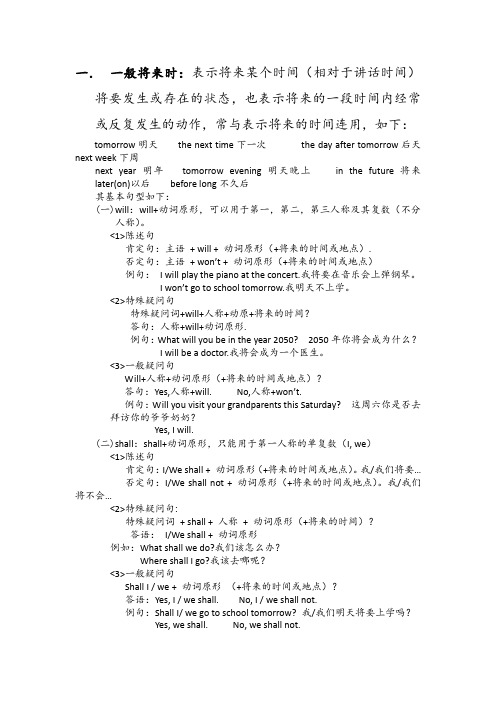一般将来时1
一般将来时知识点总结(word)1

一般将来时知识点总结(word)1一、一般将来时1.—I wonder if you for a picnic tomorrow.—If it ,I will go.A. go, not rainB. go, doesn't rainC. will go, isn't rain.D. will go, doesn't rain.【答案】 D【解析】【分析】句意:--我想知道明天你是否去野餐。
--如果天不下雨,我就去。
分析:第一个句子为宾语从句,主句为一般现在时,从句用原来的时态;第二个句子为条件状语从句,体现主将从现的原则,主语是第三人称单数,因此助动词用does.故选D【点评】考查动词的用法。
2.— Let's go fishing if it this weekend.— But nobody knows if it .A. is fine; will rainB. will be rain; rainsC. will be fine; will rainD. is fine; rains 【答案】 A【解析】【分析】句意:——如果这个周末晴天我们去钓鱼吧。
——但是没人知道是否会下雨。
第一个空前的if引导条件状语从句,意思是“如果”,从句中用一般现在时表示将来;第二个空前的if引导宾语从句,意思是“是否”,根据从句的tomorrow可知用一般将来时;故选A。
【点评】考查动词的时态。
3.—May I speak to Mr. Smith?—Sorry, he _______ Australia. But he _______ in two days.A. has been to; will come backB. has gone to; will be backC. has been in; would come backD. is leaving for; doesn't come back【答案】 B【解析】【分析】考查动词的时态。
一般将来时时态用法讲解

⼀般将来时时态⽤法讲解⼀般将来时时态1. ⼀般将来时的定义⼀般将来时表⽰在现在看来即将要发⽣的动作或存在的状态。
常⽤时间副词tomorrow, soon或短语next year / week / month, in a few days, in the future, sometime 做状语。
如:What will you do this afternoon?你今天下午⼲什么?We will have a meeting tomorrow. 我们明天要开会。
He is going to study abroad(到国外) next year. 明年他要出国学习。
2. ⼀般将来时的结构及应⽤(1) shall / will + 动词原形。
表⽰即将发⽣的动作或存在的状态。
特别是表⽰客观性的事情或在某条件下要发⽣的事情,只能⽤此结构。
如:What shall we do if he doesn’t come 如果他不来,我们该怎么办?Will you be free this evening 今天晚上有空吗?I think he will tell us the truth(真相)。
我想他会告诉我们真实情况的。
(2) be going to + 动词原形。
表⽰已经计划或安排好了的事情,也可表⽰有迹象表明肯定要发⽣的事情。
如:We are going to have a meeting to discuss (讨论)the matter this evening. 今天晚上开会讨论这件事情。
Look at the black clouds over there. I think it is going to rain soon. 看⼀看那边的乌云,我想天要下⾬了。
There is going to be an English evening this week. 本周要举⾏⼀个英语晚会。
(3) be +现在分词。
【英语】高考英语专题汇编一般将来时(一)及解析

【英语】高考英语专题汇编一般将来时(一)及解析一、单项选择一般将来时1.—Tom is so joyful that he smiles at everyone.—So ________ you if you get the first in the exam.A.do B.areC.would D.will【答案】D【解析】句意为:——汤姆如此高兴以致于见人就笑。
——如果你考试得了第一,你也会这样。
条件状语从句(if...)若用一般现在时,则主句要用一般将来时;此句相当于:You will also be so joyful if you get the first in the exam.。
2.---I don’t know when _____ tomorrow.---I will call you as soon as he_____.A.will he come; arrives B.he will come; arrivesC.he will come; will arrive D.will he come; will come【答案】B【解析】考查时态。
第一句为when 引导的宾语从句,从句的时态,要根据时态本身来决定,第二句为if 引导的条件状语,主句为一般将来时,从句要用一般现在时,代替将来时,故选答案为B3.—Guess what, we've got our visas for a short-term visit to the UK this summer.—How nice! You ________ a different culture then.A.will be experiencing B.have experiencedC.have been experiencing D.will have experienced【答案】A【解析】【详解】考查时态。
英语一般将来时用法详解(1)

点评:固定句式:it be一段时间before从句;当Before引导的时间状语从句中使用一般现在时的时候,前面的主句使用将来时。May放在句首,运用倒装句表示对对方的祝愿。
3.“When he _____ is not known yet.” “But when he ____, he will be warmly welcomed.”
2.---It ______ be only two days before I have the job interview.
---______ you succeed.
A.must; MayB.must; ShouldC.will; MayD.will; Should
【答案】C
【解析】
试题分析:考查倒装句和时态。第一空考查了固定句式中的时态。固定句式:it be一段时间before从句;当Before引导的时间状语从句中使用一般现在时的时候,前面的主句使用将来时。第二空使用倒装句的形式may you succeed祝你成功。
英语一般将来时用法详解(1)
一、单项选择一般将来时
1.Why don’t you put the meat in the fridge? It will_______fresh for several days.
A.be stayedB.stayC.be stayingD.have stayed
【答案】B
考点:考查时态
11.(陕西重点中学高三二模)We pursue happiness, thinking one day we will find it. But ________ it by seeking it.
A.rarely will we findB.rarely we will find
(完整版)一般将来时

一.一般将来时:表示将来某个时间(相对于讲话时间)将要发生或存在的状态,也表示将来的一段时间内经常或反复发生的动作,常与表示将来的时间连用,如下:tomorrow明天the next time下一次the day after tomorrow后天next week下周next year明年tomorrow evening明天晚上in the future将来later(on)以后before long不久后其基本句型如下:(一)will:will+动词原形,可以用于第一,第二,第三人称及其复数(不分人称)。
<1>陈述句肯定句:主语+ will + 动词原形(+将来的时间或地点).否定句:主语+ won’t + 动词原形(+将来的时间或地点)例句:I will play the piano at the concert.我将要在音乐会上弹钢琴。
I won’t go to school tomorrow.我明天不上学。
<2>特殊疑问句特殊疑问词+will+人称+动原+将来的时间?答句:人称+will+动词原形.例句:What will you be in the year 2050? 2050年你将会成为什么?I will be a doctor.我将会成为一个医生。
<3>一般疑问句Will+人称+动词原形(+将来的时间或地点)?答句:Yes,人称+will. No,人称+won’t.例句:Will you visit your grandparents this Saturday? 这周六你是否去拜访你的爷爷奶奶?Yes, I will.(二)shall:shall+动词原形,只能用于第一人称的单复数(I, we)<1>陈述句肯定句:I/We shall + 动词原形(+将来的时间或地点)。
我/我们将要…否定句:I/We shall not + 动词原形(+将来的时间或地点)。
一般将来时(1)

with us next week.
3. Is the boy going to join
(join) us
tomorrow afternoon?
4. What are his teachers going to do
4. We are going to meet in front of the Garden Theatre. (对画线部分提问) W__h_e_r_e__ a_r_e_______ you going to meet ? 5. I am going shopping with my mother tomorrow. (对画线部分提问)
2. Su Yang’s uncle is going to Shanghai next week.(改成一般疑问句) Is Su Yang’s uncle going to Shanghai next week? 3. Ma Li is going to fly a kite this weekend.(对画线部分提问) What is Ma Li going to do this weekend?
tomorlm.
方法:根据句子结构一部分一部分地写出来
改写句子
The children are going to have a picnic(野餐) tomorrow.
否定句:
The children are not going to have a picnic tomorrow.
We are going to Beijing by plane tomorrow morning. 4 她这个周末准备去放风筝吗?是的,她是。 Is she going to fly a kite this weekend? Yes, she is. 5 苏海和苏阳明天晚上打算干什么?她们准备看一场电影。 What are Su Hai and Su Yang going to do
一般将来时1

一般将来时一、概念:表示将要发生的动作或存在的状态及打算、计划或准备做某事。
句中一般有以下时间状语:tomorrow, next day(week, month, year…),soon, the day after tomorrow (后天)in 后加一段时间(in three days)。
二、基本结构:①be going to + do;②will+ do.三、否定句:在be动词(am, is, are, was, were)后加not。
例如:I’m going to have a picnic this afternoon. →I’m not going to have a picnic this afternoon.I will visit the Great Wall in three days. → I wo n’t visit the Great Wall in three days.四、一般疑问句: be或will提到句首,some改为any, and改为or,第一二人称互换。
例如:We are going to go on an outing this weekend. → Are you going to go on an outing this weekend?五、对划线部分提问。
一般情况,一般将来时的对划线部分有三种情况。
1.、问人。
Who 例如:I’m going to New York soon. →Who’s going to New York soon.2、问干什么。
What … do.例如: My father is going to watch a race with me this afternoon. →What is your father going to do with you this afternoon.3、问什么时候。
When.例如:She’s going to go to bed at nine. →When is she going to bed?六、同义句:be going to = willI am going to go swimming tomorrow(明天). = I will go swimming tomorrow.be going to与will两者都可表示将要发生的事、将要去做某事,但它们有如下几点区别:be going to与will的区别:1. be going to 表示近期、眼下就要发生的事情,will 表示的将来时间则较远一些,如:He is going to write a letter tonight.He will write a book one day.2. be going to 表示根据主观判断将来肯定发生的事情,will表示客观上将来势必发生的事情。
最新一般将来时1

最新一般将来时1一、一般将来时1.—I wonder if you for a picnic tomorrow.—If it ,I will go.A. go, not rainB. go, doesn't rainC. will go, isn't rain.D. will go, doesn't rain.【答案】 D【解析】【分析】句意:--我想知道明天你是否去野餐。
--如果天不下雨,我就去。
分析:第一个句子为宾语从句,主句为一般现在时,从句用原来的时态;第二个句子为条件状语从句,体现主将从现的原则,主语是第三人称单数,因此助动词用does.故选D【点评】考查动词的用法。
2.I don't know whether mom _________ me to Beijing next week.A. takeB. takesC. will takeD. would take【答案】 C【解析】【分析】句意:我不知道妈妈下周是否会带我去北京。
分析句子结构可知,此处是宾语从句,主句时态为一般现在时,从句时态根据主现从任原则,再根据从句中的next week可知,从句应该是表示将来的动作,所以用一般将来时,用will do形式,故选C。
【点评】考查宾语从句时态。
注意宾语从句时态的主现从任原则。
3.— There ________a football match on TV tonight. I can't wait to watch it.— Me, too. It's ________ Guangzhou Evergrande and the Australian team Melbourne Victory.A. will be; betweenB. will be; bothC. will have; betweenD. will have; both【答案】A【解析】【分析】句意为:---今晚将有一场电视直播足球比赛,我非常想看。
